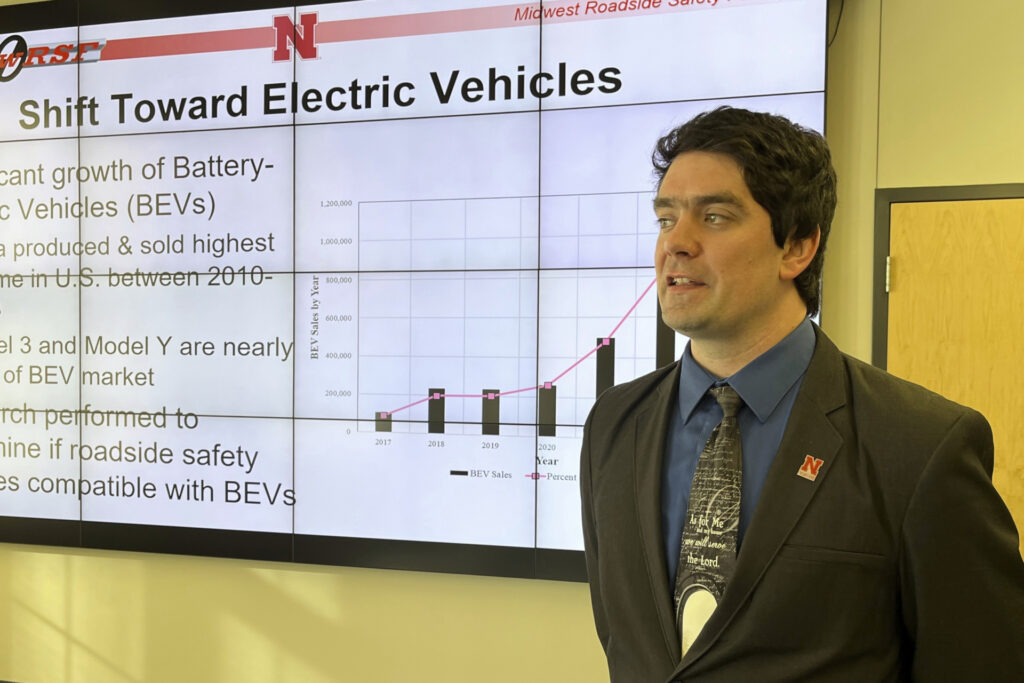Highway guardrails may be no match for heavy electric vehicles (EVs), preliminary test results released Thursday suggest, raising concerns about the nation’s roadside safety system.
The University of Nebraska-Lincoln’s Midwest Roadside Safety Facility ran a crash test examination using a nearly four-ton 2022 Rivian R1T.
When the pickup truck crashed through a metal guardrail and barely slowed down before hitting a concrete barrier, it reportedly came as little surprise to the researchers.
“We knew it was going to be an extremely demanding test of the roadside safety system,” Cody Stolle, a member of the facility, told the Associated Press. “The system was not made to handle vehicles greater than 5,000 pounds.”
The test crash was intended to see how guardrails, which line tens of thousands of miles of roads in the United States, would fare against EVs that weigh thousands of pounds more than an average gasoline-powered sedan.

Engineer Cody Stolle, with the University of Nebraska’s Midwest Roadside Safety Facility, discusses the potential affect heavier electric vehicles could have on the nation’s roadside guardrail systems. Preliminary test crashes conducted last fall showed current guardrails did almost nothing to keep an electric Tesla sedan and a nearly 4-ton Rivian pickup truck from leaving the roadway at high speeds. (AP Photo/Margery Beck)
The report concluded that the nation’s guardrails were simply not made to handle vehicles greater than 5,000 pounds.
The disparity is due to EVs typically weighing 20 percent to 50 percent more than conventionally-powered vehicles thanks to outsized batteries that can weigh almost as much as a small petrol or diesel-powered car.
And they have lower centers of gravity.
"EV adoption is… not growing at the pace that I think ourselves and the industry had expected.” https://t.co/EO3ZQfTTRE
— Breitbart News (@BreitbartNews) November 22, 2023
These factors all combine to mean guardrails, typically made of steel, can do little to stop electric vehicles from pushing through – at least according to the university study.
The results of the crash test at a time when the burgeoning popularity of EVs has led transportation officials to sound the alarm over the weight disparity of the new battery-powered vehicles and lighter gas-powered ones, the AP report notes.
Last year, the National Transportation Safety Board expressed concern about the safety risks heavy electric vehicles pose if they collide with lighter vehicles, adding yet another question mark to the viability of EVs for wider public usage.
You bet your bippy. https://t.co/tQ2ygTUl7a
— Breitbart News (@BreitbartNews) December 1, 2023
The report follows another study that showed heavy electric vehicles cause twice as much damage to road surfaces than their combustion-powered equivalents, as Breitbart News reported.
A UK study led by the University of Leeds in 2023 found the average electric car puts 2.24 times more stress on roads than a similar petrol vehicle – and 1.95 more than a diesel. Larger electric vehicles can cause up to 2.32 times more damage to roads.
The stress on roads causes greater movement of asphalt which can lead to small cracks and eventually expand into potholes with local government authorities left to repair the damage.
COMMENTS
Please let us know if you're having issues with commenting.